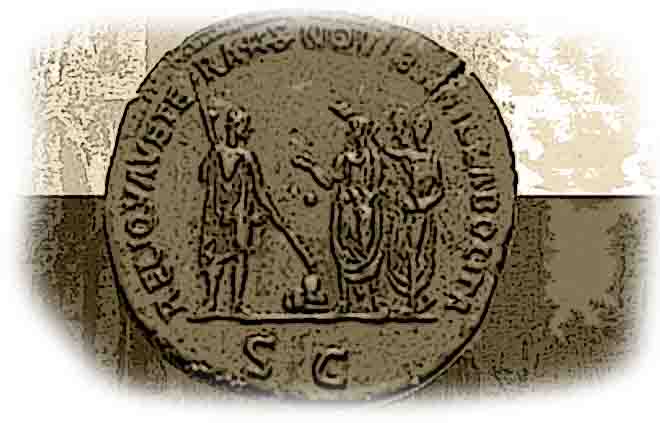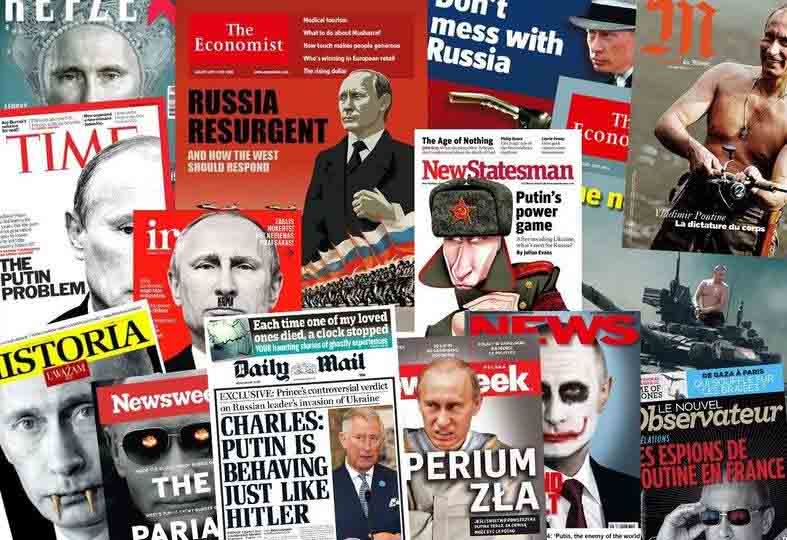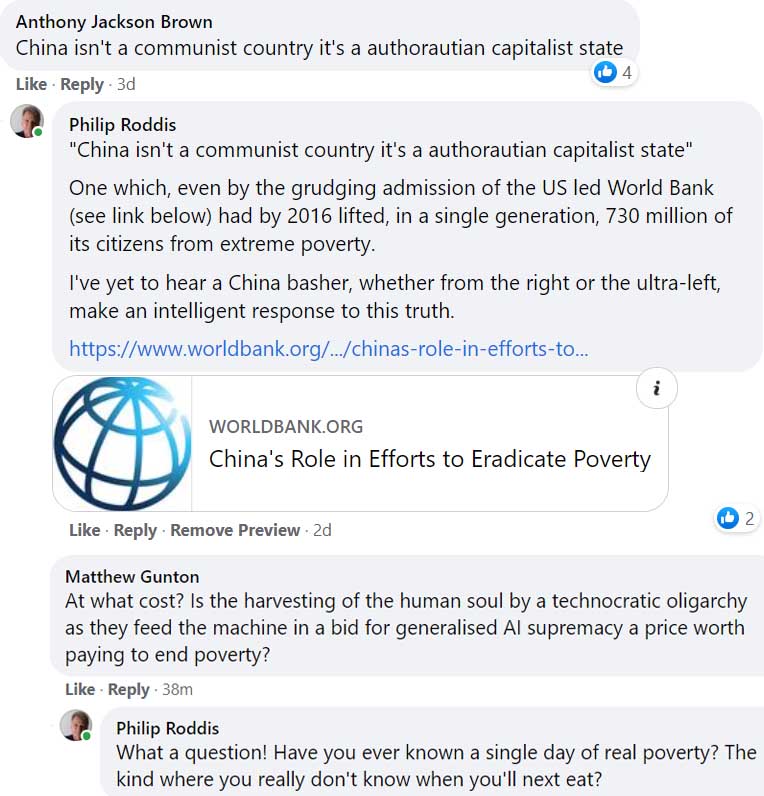
While taking on the belligerent idiocy of the Observer’s Simon Tisdall two weeks ago, I blamed his elephant-in denialism – and that of his employer and corporate mass media at large – re the existence of the US Empire.
The gist of Tisdall’s piece was that a ‘democratic West’ led by Uncle Sam must confront (even at risk of Armageddon) the ‘authoritarianism’ of China and Russia. My responses to this common or garden trope tend to focus less on its ‘authoritarian’ accusation, more on the illusory nature of democracy in the West when – to select the crispest of a number of arguments – democracy implies consent, consent is meaningless if uninformed and informed consent implies genuinely independent media. That last we do not have. As Chomsky rightly reminds us, media are “large corporations selling privileged audiences to other corporations”. 1
What I’ve not done, however, is interrogate the notion that “authoritarianism” is self evidently A Bad Thing. It’s an assumption I’ve been content to leave unexamined. But if Western societies are ruled by oligarchies – they are – and if those oligarchies pose an existential threat to human survival – they do – the question arises, how can they be opposed? For one like me – with no faith in the capacity of social democracy, revolutionary cults or direct action to effect change of the nature, scale and timeliness our circumstances require – that question demands that even our most cherished axioms be subjected to scrutiny. Could it be that the only force with the will and wherewithal to safeguard humanity’s future – and that of the species we arrogantly share this earth with – is the very ‘authoritarianism’ we are dutifully brainwashed into loathing?


The question leads me to Michael Hudson. His Destiny of Civilisation: Finance Capitalism, Industrial Capitalism or Socialism was published in May 2022 and reviewed here. It argues that Western capitalism has been hijacked by rentiers 2 to form FIRE dominated economies which create little new value but generate super-profits for non productive elites who have a monopoly on the renting out of land and money while the masses grow increasingly mired in debt and, other than in privileged niches, see real wages and job security in freefall.
Let me make an aside. I say the threat of a multipolar world, to the rentiers who control the narrative and ‘democratic’ governance in the West, is why countries which pose no danger to you and me are the targets of incendiary demonising by the most successful propaganda ever; working 24/7 to pull off what should be the impossible feat of eclipsing evidence and reason to depict the West in general, and USA in particular, as forces for good. That “we” are armed to the teeth is, according to this narrative, purely defensive. That “we” wreak sorrow and destruction on far off lands is, according to this narrative, because “our” moral rectitude and disinterested concern for global justice (even after 500 years of rule, direct or indirect, have made “us” rich and “them” poor) compels “us” to do so. With heavy hearts, naturally.

Back to Professor Hudson, an American Sinophile seen as one of the finest political economists – some say the finest – of our day. Destiny of Civilisation looked on the one hand to classical political economy; to Smith and Ricardo, Marx and Mill. It accorded central place to something those writers, for all their differences, spoke of with one voice: the crowding out of productive by non-productive capital. 3
On the other hand Michael looked to China’s decidedly hands-on control of its capitalists. It’s a truth I’ve done my bit to give voice to.

FB exchange some 2 years ago. I should have said “…where you really don’t know when your children will next eat …”
I confess to initial bemusement when last month Michael followed Destiny of Civilisation with a book – The Collapse of Antiquity: Greece and Rome as Civilization’s Oligarchic Turning Point – on 3,000 years of debt and credit management in the Near East prior to the rise and descent into decadence of Greece and Rome. Was this octogenarian taking time out – he’d earned it – to pursue a personal hobby horse in his twilight years?
Not a bit of it. Last month Michael met with Danny Haiphong of Left Lens to talk about The Collapse of Antiquity, and its relevance to our turbulent times. Along the way he touches on a number of matters of burning topicality. One is that the current leveraging of interest rates – by The Fed, Bundesbank, Bank of England and their fiscal equivalents across the West – to protect creditors and drive down wages is but the latest form, such measures being as dysfunctional as they are scurrilous, of a threat as old as the hills posed by rentier elites in hyper-financialised economies. Another is the historic role of ‘authoritarian’ leadership in using debt forgiveness to check a mortal danger not only to meaningful democracy but to economic life itself. 4
Here’s how the discussion begins:
DANNY HAIPHONG: You have a new book that has recently released called “The Collapse of Antiquity: Greece and Rome as Civilization’s Oligarchic Turning Point”.
I’m going to pull up your website. Everyone can find this link in the description of this video. But this book traces the roots of this creditor oligarchy.
Right now there is this banking collapse. We’ve had a few banks in the United States collapse. There’s a lot of concern after Credit Suisse was absorbed by UBS, the Swiss bank.
And there’s a lot of worry in the financial markets, among these large monopoly creditors. What is going on, and how does your book help us understand how we got to this place?
MICHAEL HUDSON: Well, what happened in Greece and Rome is very much like what is happening today. And there’s a common denominator in all of the Western Financial systems, debts grow by compound interest.
That is, any rate of interest has a doubling time. [Debts] sweep up steadily, and the real economy grows much more slowly, so that debts mount up without the economy being able to pay them and there’s a crash.
Well, before you had Greece and Rome, you had 3,000 years of Near Eastern civilization realizing this.
And periodically, every new ruler that would come to the throne in the Near East for thousands of years would simply wipe the slate clean of personal debts and start all over, in balance. Because they realized that if you didn’t cancel the debts, then you would have your citizens fall into bondage and would have to work for their creditors and lose their land to foreclosing creditors. All the land would end up in the hands of just a few creditors who would usually overthrow the the government and try to take over.
Well, what made Greece and Rome and all subsequent societies, down to today’s United States, so different is they didn’t cancel the debts. They left the debts in place. And instead of having a ruler, or some central authority able to stop an oligarchy from developing and taking over and monopolizing all of the money and all the land, there wasn’t any central ruler.
This is usually called democracy. But democracies for the last 2500 years have not been very good at being able to check the rise in credit or interest. And that’s why Aristotle said that many constitutions of the Greek states claim to be democratic but they were really oligarchic.
And Aristotle said, — Under democracy, creditors begin to make loans and the debtors can’t pay and the creditors get more and more money, and they end up turning a democracy into an oligarchy, and then the oligarchy makes itself hereditary, and you have an aristocracy.
And unless members of the aristocracy say, — Wait a minute, we’re bankrupting society, we’re reducing the whole society to poverty. Nobody’s going to fight for us anymore because they’re all in bondage.
Unless you have some member of the upper class or some family taking over, like Cleisthenes did in Athens in 506 BC, then you’re going to have what happened in Rome — a Dark Age.
And a Dark Age is when the creditors take over and reduce all the rest of the economy to bondage. Or today you call it “austerity” or “debt deflation”.
So what’s happening in the banking crisis today is that debts grow faster than the economy can pay. And so when the interest rates finally began to be raised by the Federal Reserve, this caused a crisis for the banks.
And the result is the Silicon Valley Bank (SVB) and the other banks that have gone under are just the tip of the iceberg.
When interest rates go up, that makes the market price of bonds and mortgages much less.
Think of a bank as creating credit on its computer. It creates mortgage loans or loans to businesses. But in fact, people have been withdrawing their money from the banks in the last few years, in the last two years especially, because interest rates are going up.
What happened at Silicon Valley Bank — the same thing is happening at New York banks, at banks all over the country.
Banks are paying depositors 0.2% on their deposits. Depositors can simply, if they want, take their money out of the bank and buy US treasury notes paying 4%.
So if you have enough money to make it matter how much interest you get, of course you’re going to take the money out of the bank and buy Treasury notes or money market funds or something yielding more than the bank will pay.
[SVB] was making enormous profits by not paying depositors anywhere near what it was able to charge its clients. And so when the depositors began to withdraw their money, they began withdrawing it throughout the whole US banking system.
How are the banks going to pay? Well, banks invest their money in mortgages and government securities.
[SVB] bought long-term mortgages when interest rates on government bonds were very low, only 0.1%. The bank is able to make an arbitrage profit by paying depositors 0.2% and buying a long-term government bond at 1.8% for 30 years.
Well the problem is that when the interest rates went up, ostensibly to create more unemployment and to prevent wages from rising by bringing on an even deeper recession than we have now, the bank had to sell these Treasury securities in order to pay the depositors. And it had to sell them at a loss.
And all of a sudden the bank depositors and others noticed the fact that, while [SVB] reported all of its assets as what it paid for them — 100 cents on the dollar — when it had to sell them, they were only worth 70 cents on the dollar.
Throughout the whole US economy, banks, on their balance sheet, can report their assets at what they paid. When interest rates go up, the market price goes down, so all throughout the US economy, banks have said that they have more assets backing the deposits than they can ever realize by actually selling them on the market.
So you have basically a fictitious set of economy reportings, and the depositors at Silicon Valley Bank and other banks said, — Well, this is a very tenuous situation, let’s just take our money out.
And the result is that [SVB] had to sell what it had, report losses, and essentially it was insolvent. Well, the real question is: How many banks in America are insolvent?
Whenever interest rates go up, this threatens banks with insolvency, because this is how the financial system is structured. The only hope of the financial system to avoid insolvency — which it did way back in 2008 — was for the Federal Reserve to flood the economy with credit and inflate the economy.
That’s what the Federal Reserve quantitative easing was all about. Low interest rates immediately raised the price of bonds, real estate, and stocks. And the Fed has said its job is to protect the banks by inflating the economy — inflating, not the economy really, but by inflating the asset markets, inflating the bond market, inflating the stock market.
These are the markets that are owned mainly by the wealthiest 10% of the population.
So if you look at the American economy since 2008, when the Obama depression began, real wages have been drifting downward, but the wealth of the upper 10% has gone way way upward.
And that’s a result of inflating the capital markets by the Fed, while trying to deflate the labor market.
The Fed said — We want to support stock prices by making companies more profitable, and we do that by creating a depression, so if we can throw 2 million Americans out of work, then people will be fighting for jobs and it’ll be easier for employers to prevent wages from rising.
The job of the Fed is not to promote employment but to promote unemployment. To create desperation among the workers so that they really can’t keep up their wages with living standards.
And we’re in the same kind of slow crash that you had in Greece and Rome and that you always have in almost any financialized economy where all the wealth is sucked up to the top, and there’s a transfer, not only of income, but of property — of real estate, of stocks and bonds, of companies — to the creditor class. And that’s what we’re having today.
The creditor class in the US is very much like the oligarchy in Greece and Rome or under feudalism, except that class today is no longer a landlord class, because rent is for paying interest and it’s a financial class, not a landlord class.
If you look at where all of this legal system came from that makes Western civilization so different from the rest of the world — well, it’s that Western civilization has a pro-creditor law that turns out to be a law that favors a minority at the top instead of trying to preserve all overall economic growth, which was the objective of economic takeoffs from the Bronze Age, Sumer, Babylonia, to the first millennium, to the Near East, to Asia, for almost every country outside of the West.
So we’re seeing a division between the West and the rest of the world finally today that is very much like what you had 2000 years ago.
DANNY HAIPHONG: That’s a fascinating connection, and honestly I haven’t heard many people make that connection, and it’s very compelling.
You mentioned the Fed, and Jerome Powell has been on record probably more times than I can count talking about this anti-labor policy that has been a reaction to, or perhaps very interconnected to, all that has transpired over the last several years leading into these bank crashes and the bank runs.
Could you talk more about that policy? Why is it that the Federal Reserve is so interested in telling us that they want to lower wages, increase unemployment?
Maybe you can talk about the comparison to 2007, 2008, too. When that crisis happened, the United States government bailed those banks out and basically didn’t punish them, and it was the people who were suffering from subprime mortgages and other ills of this massive credit and debt issue. They were not bailed out.
So what is happening? Why is the Fed seemingly attacking the living standards of ordinary people while the banks that are creating the problem are seemingly doing very well right now?
MICHAEL HUDSON: The problem is not only the Federal Reserve economists, it’s the whole academic economic theory that’s being taught today.
Today’s economic theory — it’s junk economics, basically. It imagines that the root of all inflation is labor wanting more wages, and the solution to any inflation — and in fact to any economic problem — is to pay labor less.
This is the kind of junk economics that came out of the University of Chicago — the monetarist ideas of Milton Friedman, and it goes back to Austrian economics in the late 19th century.
It was an anti-labor theory of how economies work, to oppose socialist theories of how economies work, and in fact to try to tell people, again and again, that the root of every problem is labor getting greedy and wanting to survive and wanting to protect its living standards instead of being forced further and further into debt.
Well let’s look at economic reality. I think all of your listeners know — what’s certainly in the news every single week for the last year has been — what really has caused the inflation.
There are a number of things, for instance, America’s sanctions against Russian oil and food exports. It blocked Russia’s exports of oil and Russian accounted for 40% of the world’s oil trade and an even larger proportion of its gas trade, and much of its agricultural crop trade — grain trade — as well.
Well, once this oil and gas and food is taken off the market, energy prices have gone up, food prices have gone up, and that’s one major cause.
Another major factor is the fact that the economy in America and Europe is becoming much more monopolized, and the monopolies have simply been raising their prices, especially the agricultural distribution monopolies that buy from the farmers and sell to the grocery stores and the other big distributors.
The monopolies, really their costs are not going up very much. But they say, — Well the Fed’s talked so much about inflation being a problem that we’re anticipating that inflation is going to be another 10% next year, so we’re just raising the prices.
So they’ve increased their prices way over the cost of production to make “super-profits”. And in fact, the monopolies in the US have been making super-profits, which is why the stock market has not gone down, unlike the bond market and the real estate market.
And talking about real estate markets, there’s been a huge 20% increase in the cost of housing in the United States. Again, that’s because of the policies that were put in place by President Obama. His staff — Obama and Treasury Secretary Geithner — really forced the economy into an avoidable depression by bailing out the banks instead of writing down the junk mortgages in 2009 and 2010.
Instead of writing down the mortgages to the realistic market value, Obama evicted eight or nine million American families, primarily Black and Hispanic families or low income families. They had to sell their houses.
Meanwhile the Federal Reserve was lowering interest rates, enabling private capital firms like Blackstone to come in and begin buying up all these properties. Along with other capital firms, they became absentee landlords.
So the result is that since 2008 home ownership rates have fallen in the United States from 58% or 59% in 2009 to where they are now, which is below 50%.
Less than half of Americans own their own homes, as a result of monopolists buying tens of thousands — millions — of homes as investment.
So the American economy is shifting, from a middle class economy, where people own their own homes, to an absentee-owned landlord-run economy, run by the landlords essentially borrowing from the banks in a kind of symbiotic relationship.
Economists call this the FIRE sector: Finance, Insurance, and Real Estate. All together.
The decrease in homeownership, increase in absentee landlordship, monopoly power, and the American sanction and economic, and now military, war against Russia, China, Iran, and their allies, is what is really pushing up prices, much faster than wages have come up.
Wages are much less than the rate of inflation. You can be sure it’s wages that are not pushing it up.
But the Federal Reserve economists are taught in school — there’s almost no description of actual statistics for students who get an economic degree today. There’s no economic history taught anymore in the curriculum, as it was in the 1960s when I was in graduate school.
There’s not even a history of economic thought, so that you don’t get the concept of “economic rent” and exploitation that the 19th century was all about. Adam Smith and [David] Ricardo and John Stuart Mill and [Karl] Marx, up through Thorstein Veblen — people like that.
Essentially you have economics trivialized into just a few generalizations that have become part of the class war.
What the banks and the 1% have discovered is: if you can prevent people from knowing what is actually causing the inflation; if you can prevent them from looking at actual economic statistics; if you can get economic history and thought out of the curriculum, they’re willing to believe there’s no alternative. Because all they see in the mainstream media — New York Times, Washington Post, Wall Street Journal — all they see is the same propaganda statement, that all of our problems are because labor is making too much.
Well, the real problem is that labor is making so little that it’s not able to buy the goods and services that it produces, because it has to pay higher mortgage costs, it has to pay higher credit card costs.
This week the Federal Reserve announced that the average credit card debt in the United States was $10,000. So the average credit card holder holds $10,000 in debt.
If you pay your credit card regularly, the rate is 20%. If you have a late fee, or you’re behind, then it goes up to about 30%.
All of this is counted as growth in GDP. The late fees that banks charge — and they make even more in late fees and penalties than they make in interest at 20% — is called “financial services” in the GDP. As if the banks are providing a service of charging their cardholders much higher interest and penalty rates.
So, you could say that, not only are the bank statistics fictitious, but the whole GDP accounting format that counts finance, landlordship, and economic rent as part of the product, even though it’s unearned income, it has nothing to do with production — even though interest and rent are charges that should be subtracted from GDP as economic overhead, they are counted as part of GDP growth.
Likewise, when people get sicker — as during COVID — and they have to pay higher medical costs and insurance, that accounts for 18% of GDP, which is medical overhead. As if somehow the economy is growing when people have to pay more for their health insurance programs or when they get sick.
So it’s a kind of inside-out economy …
You can hear the entire and utterly fascinating discussion on Left Lens:
The programme is two hours twenty but the discussion with Michael is the first ninety minutes.
Alternatively, the video is replicated – with transcript (almost 12k words) – on the excellent Naked Capitalism site, with brief intro by Yves Smith.
Whichever way you go, your time will be richly rewarded. Have a good Easter break folks.
* * *
- In essence, journalists who know what’s good for them please editors. Editors who know what’s good for them please proprietors. Proprietors crave seats at the high table and, more importantly, need advertisers. (Exceptions, such as a Guardian dependent on the largess of men like Gates and Soros, and state media like the BBC, have constraints no less powerful. See Britain decides! and Monolithic control at the Guardian? Also briefly considered in those posts is the role of ideology.) While media do lie actively on matters vital to power, they disinform more by omission and we need not suppose subjectively dishonest journalists. Simply self-servingly credulous ones. Moreover, media compete for market share. Within limits set by an Overton Window of permissible discourse, they not only disagree with but seek to ‘scoop’ one another in ways that may embarrass power. (The Guardian last week ran a well researched feature casting Britain’s royal family in a disgraceful light. But republicanism poses no irreconcilable threat to capitalism. America, France and other imperialisms without a monarchy maintain exploitative relations with their own citizens, and with the global south, without need of royalty.) Here too Chomsky sheds useful light: “The smart way to keep people passive and obedient is to strictly limit the spectrum of acceptable opinion, but allow very lively debate within that spectrum – even encourage the more critical and dissident views. That gives people the sense there’s free thinking going on, while all the time the presuppositions of the system are being reinforced by the limits put on the range of the debate.”
- Many Marxists say such ‘hijacking’ of industrial capitalism by a rentier class is inevitable; baked into the logic of capital accumulation. I haven’t space to argue the point and in any case they may be right: China may yet lose control of capitalists who made possible the lifting of hundreds of millions from poverty, are subordinate to the state – in the West it’s the other way round – and were necessitated by the Western Left’s failure to make its own revolutions, thereby obliging China to adapt, on Deng Xiaoping’s watch, to globally entrenched neoliberalism. But those Marxist critics of China offer no credible solution to the fix humanity is in. Some withdraw into ivory towers irrelevance. Some form vanguard sects whose answer to all and every capitalism induced problem is to call for the workers of the world to unite and overthrow their exploiters. Worthy cause. But I know it’s not going to happen – when the bourgeois state is formidably prepared on every conceivable front to put down insurrection – and so, I strongly suspect, do they.
- David Ricardo blamed landlordism (and limits on soil productivity) for his pessimism re the future of a barely emerged capitalism. In this he blind-eyed the growing power of bankers, not least because he was one. His lexicon spoke of ‘earned’ versus ‘unearned’ profits, rather than productive (industrial) versus non-productive (finance) capital. For my purposes the two polarities may be treated as different windows on the same thing.
- Capitalism’s intrinsic contradictions and anarchic nature beget a systemic inability – to take care of its own long term interests – well known both to its critics and, albeit more limitedly and with greater of lesser denial, its supporters. The numerous ways in which this plays out lie beyond the scope of this post.
